|
 Secure Site
Secure Site
|
 |
Archive for the 'Meditation Timers' Category
 yoga practice in bamboo As Robert Svoboda attempts to summarize the three major paths of the Vedic knowledge, he writes:
Because every embodied individual is composed of a body, a mind and a spirit, the ancient Rishis of India who developed the Science of Life organized their wisdom into three bodies of knowledge: Ayurveda, which deals mainly with the physical body; Yoga, which deals mainly with spirit; and Tantra, which is mainly concerned with the mind.
The philosophy of all three is identical; their manifestations differ because of their differing emphases. Ayurveda is most concerned woth the physical basis of life, concentrating on its harmony of mind and spirit. Yoga controls body and mind to enable them to harmonize with spirit, and Tantra seeks to use the mind to balance the demands of body and spirit.
Use our unique “Zen Clock” which functions as a Yoga Timer. It features a long-resonating acoustic chime that brings your meditation or yoga session to a gradual close, preserving the environment of stillness while also acting as an effective time signal. Our Yoga Timer & Clock can be programmed to chime at the end of the meditation or yoga session or periodically throughout the session as a kind of sonic yantra. The beauty and functionality of the Zen Clock/Timer makes it a meditation tool that can actually help you “make time” for meditation in your life. Bring yourself back to balance.
adapted from wikipedia.org
 Meditation & Yoga Timers and Clocks
Now & Zen’s Yoga Timer Store
1638 Pearl Street
Boulder, CO 80302
Posted in Chime Alarm Clocks, Japanese Inspired Zen Clocks, Meditation Timers, Meditation Tools, mindfulness practice, Progressive Awakening, Well-being, Yoga Timer, Yoga Timers by Now & Zen, Zen Timepiece by Now & Zen, Zen Timers
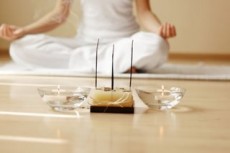 Meditation Tools by Now & Zen As a result of cultural evolution, we’re becoming more discerning about the real nature of quality. Quality thinking is concerned with the welfare of the greatest relevant whole — our whole selves, our whole environment, and our whole society. Now & Zen products embody quality of thought through their use as tools that improve your life, in the esoteric principles they embody, and in their originality. Stillness of being is also an integral part of a natural lifestyle. The practices of prayer, meditation, and yoga all contribute to a stillness of being. Now & Zen products serve as accoutrements to these practices; and they also help create a sense of stillness through the beauty of their designs.
Now & Zen’s company mission statement is as follows:
Now & Zen Mission Statement
Now & Zen, Inc. seeks to manifest on the levels of matter, mind, and spirit.
These levels translate in the business world as fact, meaning, and value.
Now & Zen’s mission is divided accordingly:
Fact: Make money selling quality products.
Meaning: Create a national brand that stands
for quality of thought, and stillness of being.
Value: Provide products that remind people they live in
the presence of the sacred, however they may define it.
 Now & Zen Headquarter Store - Boulder, CO
 - Boulder, Colorado
Please visit our website ( www.now-zen.com ) which gives further information on our products and mission. For a catalog of current Now & Zen products, please call us at: (800) 779-6383 or (303) 530-9028, or send us an e-mail.
Now & Zen – The Zen Alarm Clock Store
1638 Pearl Street
Boulder, CO 80302
(800) 779-6383
Posted in Meditation Timers, Meditation Tools, Now & Zen Alarm Clocks, Zen Timers
 Tsukyoka Yoshitoshi 1888 - Lift Depression with Meditation, Use Your Chime Meditation Timer A recent study found that age-old meditative techniques and more modern cognitive therapy can help alleviate symptoms. Anil Coumar, a psychotherapist and director of the mental health clinic at the University of Washington, Seattle, offers these do-it-yourself mood-lifting meditations:
Get moving. For many people, meditation is a remote, Eastern technique that involves sitting with your legs crossed on a cushion. But almost any activity can be mindful and healing, says Coumar. “Through a practice of mindfulness, we can see how our thoughts are not facts—they come and go.” To slow down your thinking and realize that you can release negative thoughts as quickly as they come, try this eating meditation: Hold a raisin in your hand and intentionally look at it as if you’ve never seen one before. Roll it between your fingers and notice each crease. Pay attention to your thoughts about it—maybe you’ll think, This is ugly or I’ve never noticed the true color of a raisin before. Then put it in your mouth and observe how your saliva flows as you chew.
Uncover your unconscious. Imagine you’re walking down the street and see a good friend walking in the opposite direction. You nod and smile, but your pal just looks ahead and keeps going. How do you respond? “Someone might say, ‘Oh, she probably didn’t see me.’ Another might think, ‘What did I do wrong now?’ Depending on how you interpret that event, you’re going to feel good or bad,” says Coumar. This kind of cognitive exercise can teach us how we unconsciously have these thoughts. The point? To make the normally unconscious thoughts that fuel depression conscious so you can acknowledge them—and then more easily let them go.
Our Zen Timepiece’s acoustic 6-inch brass bowl-gong clock is the world’s ultimate alarm clock, practice timer, and “mindfulness bell.”
It’s exquisite sounds summon your consciousness out of your meditative state with a series of subtle gongs. Once you experience the Zen Timepiece’s progressive tones, you’ll never want to meditate any other way. It serves as the perfect meditation timer and alarm clock . Available in 5 wood styles, including bamboo.
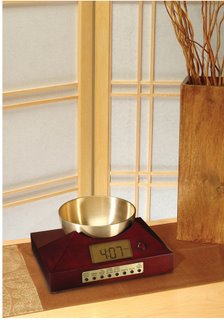 Gong Meditation Timer with Singing Bowl adapted from Natural Solutions Magazine by Ziba Kashef, 8/2009
Now & Zen’s Chime Timer & Alarm Clock Store
1638 Pearl Street
Boulder, CO 80302
(800) 779-6383
Posted in Meditation Timers, Meditation Tools, mindfulness practice, Well-being, Yoga Timers by Now & Zen, Zen Timers
 Your body has a message for you...yoshitoshi taiso Your body has a message for you. Are you listening?
Our bodies are innately wise and have much to teach us about restoring and preserving our health…if we are willing to listen. A symptom is more than an isolated event. It is a messenger from our body giving us a “heads up” that an underlying problem exists and needs attention. If we learn to pay attention and understand the message provided by these “teaching assistants” sent by our bodies, symptoms become opportunities for implementing changes.
Mind-Body Connection
Your body and mind are interconnected, and each impacts the other. When you hurt your foot, your body shares this information with your mind, and you feel pain. When you’re worried about something, there is a physical response in your body. When you’re excited and happy, your body has a different physiological response.
Some people get sweaty palms when they’re nervous. Some get a sharp pain in their shoulders and neck when they feel they carry “the weight of the world.” Some people get headaches when they haven’t eaten properly. Some breathe shallowly and quickly when they’re anxious about something. These are all examples of your body providing you with information that allows you to take appropriate action.
If your observer is alert and you notice the physical phenomena present in your body, you obtain valuable information that you can use to impact your health and wellness. A pain that you’re feeling may be the result of an external incident such as banging your shoulder or cutting your foot; however, if there was not such an event, a physical ailment or change in your body’s status could be caused by some internal condition. If you pay attention to your body and address early signs suggesting that something may be wrong, you may be able to prevent larger problems from developing. Addressing these larger, more serious problems may be more painful and costly, and may require more invasive interventions.
Our Zen Clock’s long-resonating Tibetan bell-like chime makes meditating a beautiful experience – its progressive chimes begin your day with grace. When the clock’s alarm is triggered, the acoustic chime bar is struck just once … 3-1/2 minutes later it strikes again … chime strikes become more frequent over 10 minutes … eventually striking every 5 seconds until shut off.
adapted from Natural Solutions Magazine by Marc Levin, 8/2011
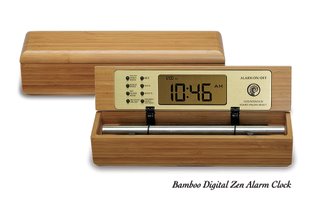 Zen Meditation Timers and Alarm Clocks with Chimes Now & Zen – The Zen Meditation Timer Store
1638 Pearl Street
Boulder, CO 80302
(800) 779-6383
Posted in Meditation Timers, Meditation Tools, mindfulness practice, Now & Zen Alarm Clocks, Well-being
 Meditation Timers and Chime Alarm Clocks An accomplished meditator is capable of overcoming every obstacle in life. Developing this level of confidence requires an approach that goes beyond simply resting in a state of repose. It is not sufficient to learn a few techniques and practice meditation just to relax and quiet your mind. To sit calmly in your room, still your thoughts, and drift into a state of torpidity is not meditation. A cow may sit still and breathe quietly when its stomach is full, but can we call this meditation?Meditation is not just for relaxation; its primary purpose is to develop the capacity to respond skillfully and gracefully to life’s difficulties as well as its joys
Followers of the spiritual path must proceed in this way. Only then will we have the opportunity to experience the real essence and value of our human life. It is our chance to be reawakened, our precious opportunity to enjoy boundless energy and employ consummate skill for our own well-being and for the well-being of others.
The nature of the mind is unobstructed. Moment by moment, one thought is born, while another one dies. This energy is unceasing, and it springs from primordial wisdom. This energy is the essence of what we are. This essence manifests, but not in any solid or substantial way. We cannot imagine it or express it. It transcends imagination and expression.
adapted from Natural Solutions Magazine by Shyalpa Tenzin Rinpoche, 3/2012
Although meditation can be done in almost any context, practitioners usually employ a quiet, tranquil space, a meditation cushion or bench, and some kind of timing device to time the meditation session. Ideally, the more these accoutrements can be integrated the better. Thus, it is conducive to a satisfying meditation practice to have a timer or clock that is tranquil and beautiful. Using a kitchen timer or beeper watch is less than ideal. And it was with these considerations in mind that we designed our digital Zen Alarm Clock and practice timer. This unique “Zen Clock” features a long-resonating acoustic chime that brings the meditation session to a gradual close, preserving the environment of stillness while also acting as an effective time signal.
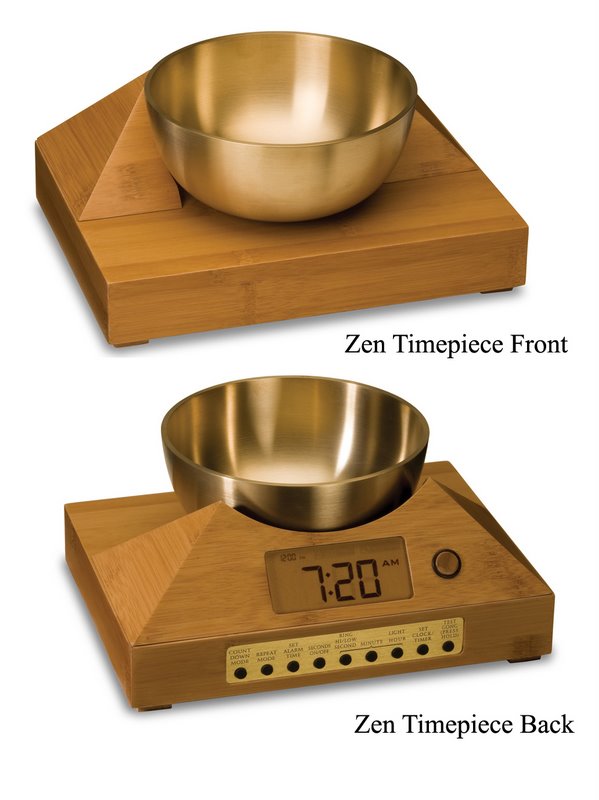 Singing Bowl Meditation Timers and Alarm Clocks Now & Zen’s Singing Bowl Timer Store
 Meditation Timer Shop In Boulder, Colorado 1638 Pearl Street
Boulder, CO 80302
(800) 779-6383
Posted in Bamboo Chime Clocks, Meditation Timers, Meditation Tools, mindfulness practice, Now & Zen Alarm Clocks, Zen Timepiece by Now & Zen, Zen Timers
 Japanese Ukiyoe Crane - Meditation Helps Us with More than Just Stress Meditation is not just for relaxation; its primary purpose is to develop the capacity to respond skillfully and gracefully to life’s difficulties as well as its joys. We have to reflect deeply on the uncertainty and brevity of our lifespan. Contemplate the fact that all the things in which we place our trust are contingent and constantly changing. We have to use our spiritual practice to look within and discover the heart of our being.
adapted from Natural Solutions Magazine by Shyalpa Tenzin Rinpoche, 3/2012
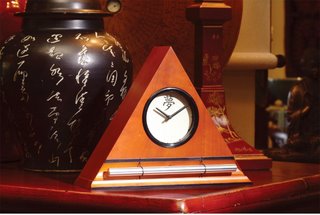 Meditation Timers and Soothing Chime Alarm Clocks Now & Zen – The Zen Chime Alarm Clock Store
1638 Pearl Street
Boulder, CO 80302
(800) 779-6383
Posted in Meditation Timers, Meditation Tools, mindfulness practice, Well-being
 Meditation It is a misconception that meditation is difficult
“Everyone says I should meditate. All spiritual books end with the advice to take time for meditation. But no one tells you how!” The young man who stood before me was completely stressed out. For months he had been trying to meditate but the more he tried, the more he failed. And now he was dumping his frustrations on me because I had just given a lecture on the importance of… meditation.
I got what he was saying. People often turn meditation into something really complex. For instance, some say when you meditate your expression should be very serious and holy as you try to curl the tip of your tongue back against the roof of your mouth while reciting an incomprehensible mantra in your mind. Or you should sit in such a way that you’re just about breaking your back, as well as your calves and knees, while rising above the pain by focusing on your breath. Or you should sit in front of a statue of an Indian god or goddess with an unpronounceable name and tune in so you can be transported to an unpronounceable place.
Is meditation really so complex? Do you really have to contort yourself to bring your mind to rest and come into the here and now? I don’t think so. Most animals and children do nothing else. It is a misconception that meditation is difficult. I say: The more difficult you make it the less you’ll do it. Meditation, after all, is nothing more than making contact with the person you were before you did your best to become everything you aren’t.
How hard can it be to be yourself? For most people, very hard. Not so much because it is hard, but because they make it hard. It is often the simplest circumstances—a walk along the beach, a sunset, a beautiful concert—that allow you to return to yourself. You forget for a moment to complicate things with worries about how you should be. You naturally return to the peace and quiet that are your true nature.
At those moments you are doing exactly what all meditation gurus and masters teach: You are fully in the here and now and completely free of anxiety, fear and all those unnecessary thoughts that make life so difficult. In short, at those moments you are the consummate yogi. You are your own meditation teacher, your own master, your own guru and your own saviour. The secret of meditation is: Keep it simple.
adapted from Ode Magazine, April 2006 by Tijn Touber
Although meditation can be done in almost any context, practitioners usually employ a quiet, tranquil space, a meditation cushion or bench, and some kind of timing device to time the meditation session. Ideally, the more these accoutrements can be integrated the better. Thus, it is conducive to a satisfying meditation practice to have a timer or clock that is tranquil and beautiful. Using a kitchen timer or beeper watch is less than ideal. And it was with these considerations in mind that we designed our digital Zen Alarm Clock and practice timer. This unique “Zen Clock” features a long-resonating acoustic chime that brings the meditation session to a gradual close, preserving the environment of stillness while also acting as an effective time signal.
 Digital Yoga and Meditation Chime Timer in Solid Walnut Now & Zen – The Zen Alarm Clock and Meditation Timer Store
1638 Pearl Street
Boulder, CO 80302
(800) 779-6383
Posted in Bamboo Chime Clocks, Meditation Timers, Meditation Tools, mindfulness practice, Now & Zen Alarm Clocks, Well-being, Zen Timers
 meditation By concentrating on asking the question “how”, not “why”, we become less judgmental on ourselves.
Gail is no stranger to depression, so she finds the psychiatrist’s advice puzzling. He suggests that instead of wondering why she feels powerless and sad, she concentrate on how she experiences these feelings. Gail casts her mind back to her last bout of depression, when she spent an entire Sunday sitting at home, unable to get off the sofa or even watch TV. All the time, she was overwhelmed by anxiety: “I’ve made so many bad choices in my life. I never should have gone into sales; I’m not cut out for it. And that’s how I met that guy who dumped me. And now it’s too late to have a child. And anyway, at my age, the risk of having a child with birth defects is four times higher.” Black thoughts tumble through her head, one after another, each one feeling so real and consuming that any kind of activity seems pointless.
Now that Gail has shaken off the latest bout of depression, and is anxious to avoid another, she’s come to a therapist from the psychology department at Louvain University in Belgium. He suggests a new approach: Avoid dark thoughts and temporary distractions; neither confronts nor prevents the feelings. Instead, he suggests, each time the physical symptoms and dark thoughts return, adopt an anthropological approach to exploring the workings of body and mind.
The instructions are unbelievably simple: “Set your Meditation Timer for 20 minutes, sit on the edge of a chair with your back straight and your hands resting on your thighs, comfortable and poised. Fix your attention on the physical sensations of your body and on finding an image or words that best describe the nature of those feelings. If thoughts come into your mind unbidden, observe them and let them fade. Then look out for the next thought or image that follows, but don’t judge it as ‘good’ or ‘bad.’ Simply note it. If you become aware you’ve let yourself be drawn into a chain of thought, bring your attention back to your breathing and observe what new flow of thoughts is taking the place of the last. It’s all about learning to be conscious of what’s happening for you here and now. Don’t worry about why you feel what you feel or why you think what you think; concentrate purely on how.”
Gail notes that when she focuses her attention on the physical symptoms of depression, or observes an anxious thought without letting it take hold, the depression gradually lifts. She understands she isn’t her depression, that it’s only one part of her.
“How” instead of “why” is so simple, yet so important. If you’re unconvinced, imagine the difference between a doctor who asks, “Why did you put on 10 pounds?” and one who says, “How are you feeling about your body?” It’s the difference between feeling judged and feeling heard.
That little word “how” is a gesture that opens the door to deeper understanding. At Cambridge University in the U.K., former professor John Teasdale showed that patients who’d suffered episodes of depression could learn to develop such trust and understanding of themselves through meditating. When he started teaching this meditation method, inspired by ancient Buddhist practice, with people who suffered from depression, Teasdale showed it was possible to reduce relapses by more than 50 percent, a success rate comparable to that of antidepressants. We all need to develop this depth of understanding of ourselves and others. All we have to do is avoid the intimidating ‘”Why?” and offer our trust with the kindly “How?”
Use our unique “Zen Clock” which functions as a Yoga & Meditation Timer. It features a long-resonating acoustic chime that brings your meditation or yoga session to a gradual close, preserving the environment of stillness while also acting as an effective time signal. Our Yoga Timer & Clock can be programmed to chime at the end of the meditation or yoga session or periodically throughout the session as a kind of sonic yantra. The beauty and functionality of the Zen Clock/Timer makes it a meditation tool that can actually help you “make time” for meditation in your life. Bring yourself back to balance.
adapted from Ode Magazine, June/July 2009 by David Servan-Schreiber is a French psychiatry professor and the author of Healing without Freud or Prozac: Natural Approaches to Curing Stress, Anxiety and Depression without Drugs and without Psychoanalysis and Anticancer: A New Way of Life and Anticancer: A New Way of Life . .
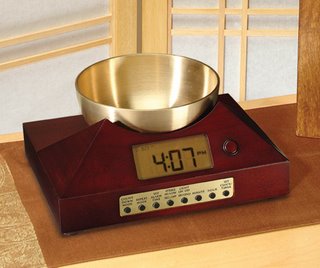 Zen Timepiece with brass singing bowl, a meditation timer
Now & Zen – Chime Alarm Clocks and Meditation Timers
1638 Pearl Street
Boulder, CO 80302
(800) 779-6383
Posted in Bamboo Chime Clocks, Meditation Timers, Meditation Tools, mindfulness practice, Now & Zen Alarm Clocks, Well-being, Zen Timers
 Meditation Some people find the quiet rhythms of meditation just plain annoying. When they try to empty their minds, all they can do is think about the Visa bill that’s due, the kids’ next soccer game, the sneaking suspicion that they’re about to be broken up with. For folks like these, there’s another option. It’s called mindfulness meditation, also known as Vipassana, and according to researchers at the HealthEmotions Research Institute at the University of Wisconsin, it may bring just as many health benefits as more mainstream meditation. In Vipassana, you don’t exactly embrace your anxious thoughts, but you don’t have to push them out the door and move the dresser in front of it, either. Instead, you observe and appreciate the distracting thoughts for what they are: part of life, part of the moment. By not resisting, you can quiet your mental chatter for a time, gain some perspective, and continue to move toward a more relaxed state.
To test the effect of mindfulness meditation on overall health, the researchers assembled 25 members of a study group that was trained in the ancient practice by researcher Jon Kabat-Zinn, who tailored it as a remedy for stress back in the 1970s. Before starting to meditate, each person was given a flu shot to stimulate the immune system; that way re-searchers could compare their bodily responses pre- and post-meditation. Sixteen people who didn’t meditate were given flu shots and included for comparison. The change was dramatic: The study group developed a significantly larger army of flu antibodies than did the nonmeditators. Also, tests showed increased electrical activity in their frontal lobes, the part of the brain associated with happiness and other positive emotions. Next, the researchers plan to study a group that’s been meditating mindfully for 30 years. In the meantime, don’t let unwelcome thoughts keep you from giving this technique a try.
Although meditation can be done in almost any context, practitioners usually employ a quiet, tranquil space, a meditation cushion or bench, and some kind of timing device to time the meditation session. Ideally, the more these accoutrements can be integrated the better. Thus, it is conducive to a satisfying meditation practice to have a timer or clock that is tranquil and beautiful. Using a kitchen timer or beeper watch is less than ideal. And it was with these considerations in mind that we designed our digital Zen Alarm Clock and practice timer. This unique “Zen Clock” features a long-resonating acoustic chime that brings the meditation session to a gradual close, preserving the environment of stillness while also acting as an effective time signal.
adapted from Natural Solutions, May, 2003
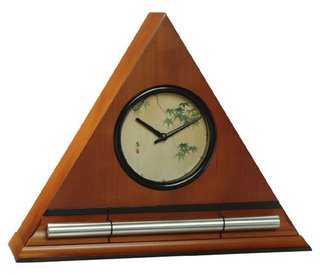 Meditation Timers with Chimes from Now & Zen Now & Zen’s Chime Timer for Meditation Store
1638 Pearl Street
Boulder, CO 80302
(800) 779-6383
Posted in Chime Alarm Clocks, Meditation Timers, Meditation Tools, mindfulness practice, Now & Zen Alarm Clocks, Well-being
 Cherry blossoms Researchers recently found that minutes-long meditation increases blood flow to the region of the brain that’s linked to learning and memory. In the morning, meditate for ten to 12 minutes before your cup of coffee or tea. (Caffeine can slow blood circulation to the brain.) Sit comfortably, let your eyes close and focus on your breath. If your thoughts start to wander, bring your attention back to your breath.
adpated from Natural Healing Magazine, November 2008
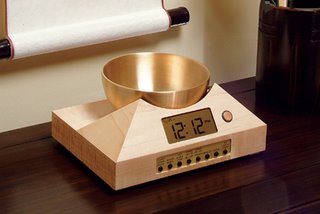 Zen Timepiece, a brass singing bowl clock and timer Now & Zen’s – The Zen Clock & Meditation Timer Sore
1638 Pearl Street
Boulder, CO 80302
(800) 779-6383
Posted in Bamboo Chime Clocks, Chime Alarm Clocks, intention, Meditation Timers, Meditation Tools, Now & Zen Alarm Clocks, Well-being, Yoga Timer, Yoga Timers by Now & Zen
« Previous Page — « Previous Entries
Next Entries » — Next Page »
|
|
|
|